Parakeets, also known as budgerigars, are popular pet birds known for their vibrant colors, playful nature, and ability to mimic sounds.
However, sometimes parakeet owners may notice their feathered friends exhibiting a peculiar behavior – biting the cage bars.
If you’re wondering why is my parakeet biting the cage, here’s your answer. This behavior can be concerning and may leave owners wondering why their parakeet is engaging in such behavior.
In this article, we will explore why is my parakeet biting the cage and provide insights on how to address it.
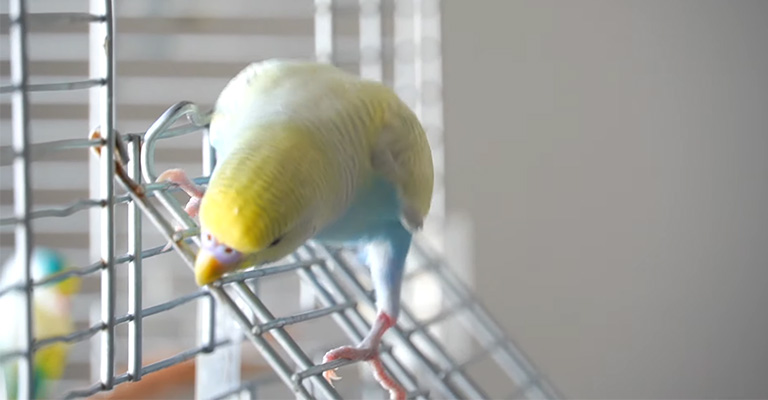
Why Is My Parakeet Biting the Cage?
Below are the common reasons why parakeets tend to bite their cage:
Natural Instincts and Exploration
Parakeets are naturally curious and active birds. In the wild, they spend their days flying, foraging, and exploring their surroundings.
When confined to a cage, they may resort to biting the bars as a means of expressing their frustration or seeking stimulation. This behavior is often seen in parakeets that are not provided with enough mental and physical stimulation.
To address this issue, it is crucial to provide your parakeet with a stimulating environment. Offer a variety of toys, perches, and swings to keep them engaged. Regular out-of-cage time for supervised flying and exploration can also help alleviate their boredom.
Attention-Seeking Behavior
Parakeets are social creatures that thrive on interaction with their human companions. If they feel neglected or lack mental stimulation, they may resort to cage biting as a way to gain attention. This behavior is often seen in parakeets that are left alone for extended periods or not given enough social interaction.
So, spend quality time with your parakeet every day. Engage in activities such as talking, singing, or playing games to provide mental stimulation.
Stress and Anxiety
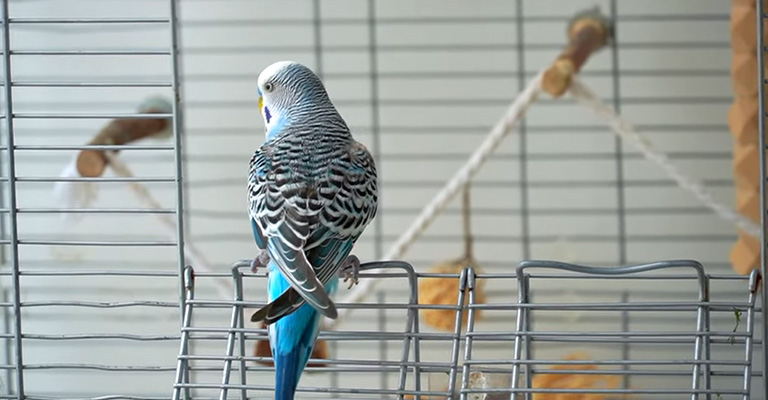
Parakeets are sensitive creatures that can easily become stressed or anxious. Changes in their environment, such as a new cage, relocation, or the presence of predators (e.g., cats or other pets), can trigger cage biting behavior.
Provide a cozy hiding spot within the cage, such as a small tent or a covered area, where your parakeet can retreat when feeling overwhelmed. Gradually introduce any changes to their environment to minimize stress.
Hormonal Behavior
Parakeets, like many other birds, go through hormonal changes during the breeding season. This can lead to increased territorial behavior, including cage biting. Male parakeets, in particular, may exhibit this behavior as a way to protect their perceived territory.
If your parakeet’s cage biting behavior is related to hormonal changes, it is essential to provide them with an appropriate outlet for their energy. Offer nesting materials, such as shredded paper or coconut fibers, to satisfy their natural instincts.
Medical Issues
In some cases, cage biting behavior may be a sign of an underlying health issue. Parakeets may bite the cage bars if they are experiencing discomfort, pain, or itching. Common health problems that can cause this behavior include mites, respiratory infections, or beak and feather disease.
Is It Dangerous for Parakeets to Be Biting the Cage Bars?
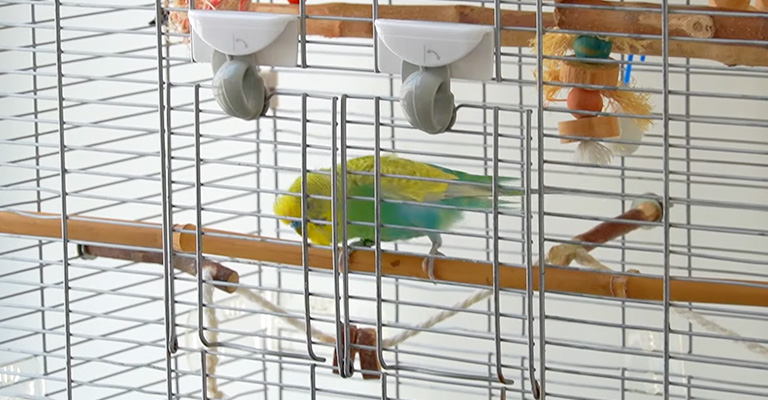
Biting the cage bars can potentially be dangerous for parakeets. Here are a few reasons why:
Injury
Parakeets have delicate beaks, and excessive biting of the cage bars can lead to injuries. They may chip or break their beaks, causing pain and potential difficulties in eating or grooming. Additionally, repeated biting can cause abrasions or cuts on their beaks or tongues.
Dental Problems
Constantly biting hard cage bars can lead to dental issues in parakeets. The repetitive impact can wear down their beak and cause misalignment or overgrowth, leading to discomfort and difficulty in eating.
Stress and Anxiety
Biting the cage bars can be a sign of stress, frustration, or anxiety in parakeets. If they are constantly biting the bars, it may indicate that they are not receiving adequate mental and physical stimulation or that their environment is not suitable for their needs.
Zinc Poisoning
Some older or poorly constructed cages may have bars coated with zinc or other toxic materials. If a parakeet excessively bites these bars, they can ingest small amounts of the toxic coating, leading to zinc poisoning.
Symptoms of zinc poisoning include lethargy, loss of appetite, vomiting, and diarrhea. If you suspect your parakeet has ingested toxic materials, seek immediate veterinary attention.
It’s crucial to address cage biting behavior in parakeets to prevent potential harm. By providing a stimulating environment, offering appropriate toys and perches, and addressing any underlying issues, you can help redirect their behavior and ensure their safety and well-being.
How to Stop a Parakeet from Biting the Cage?
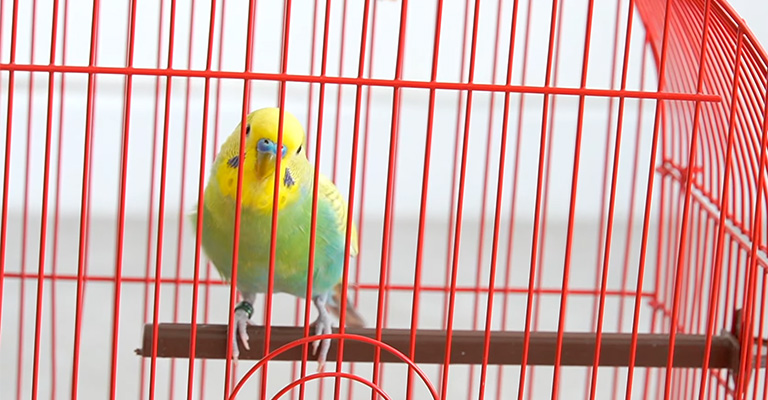
If your parakeet is constantly biting the cage, it could be a sign of boredom, frustration, or even a health issue. It’s important to address this behavior to ensure the well-being of your bird. Here are some long and detailed steps to help you stop your parakeet from biting the cage:
Assess the Cage Setup
Make sure the cage is appropriately sized for your parakeet. It should be large enough for them to move around comfortably, stretch their wings, and have space for toys and perches. A cramped cage can lead to stress and boredom, which may manifest as cage biting.
Provide Mental and Physical Stimulation
Parakeets are intelligent birds that require mental and physical stimulation to stay happy and healthy. Offer a variety of toys, such as bells, mirrors, swings, and puzzle toys, to keep them engaged.
Rotate the toys regularly to prevent boredom. Additionally, provide perches of different sizes and textures to encourage exercise and foot health.
Offer a Balanced Diet
A poor diet can contribute to behavioral issues in parakeets. Ensure your bird is receiving a balanced diet consisting of high-quality pellets, fresh fruits, vegetables, and occasional treats. Consult with an avian veterinarian to determine the best diet for your parakeet’s specific needs.
Create a Safe and Calm Environment
Parakeets are sensitive to their surroundings, so it’s important to provide a calm and secure environment. Avoid placing the cage in high-traffic areas or near loud noises. Provide a consistent daily routine, including regular sleep patterns, to help your parakeet feel secure.
Spend Quality Time with Your Parakeet
Parakeets are social birds and require regular interaction with their human companions. Spend time talking, singing, and playing with your bird outside of the cage. This will help build trust and alleviate boredom, reducing the likelihood of cage biting.
Gradual Desensitization
If your parakeet is biting the cage out of fear or anxiety, you can try desensitizing them to the cage. Start by sitting near the cage and engaging in calm activities, such as reading or watching TV. Gradually increase the duration and proximity of your presence over time.
Identify and Address Any Health Issues
If your parakeet’s cage biting behavior persists despite your efforts, it’s essential to rule out any underlying health issues. Schedule a visit with an avian veterinarian who can conduct a thorough examination and provide appropriate treatment if necessary.
Seek Professional Help If Needed
If you’ve tried various strategies and your parakeet’s cage biting behavior continues, consider consulting with an avian behaviorist or an experienced bird trainer. They can provide personalized guidance and training techniques to address the specific needs of your parakeet.
What If Parakeet Still Bites the Cage?
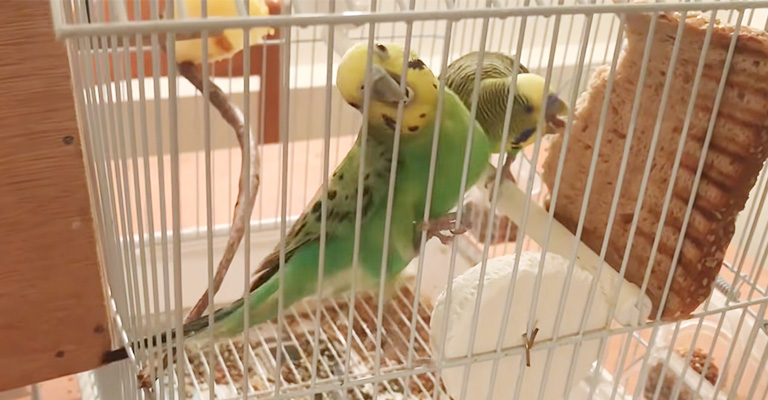
If your parakeet continues to bite the cage despite your efforts, it’s important to reassess the situation and try additional strategies. Here are some additional steps you can take:
Distract and Redirect
When you notice your parakeet biting the cage, try to distract them with a toy or treat. Offer a favorite toy or a healthy snack to redirect their attention away from the cage. This can help break the habit of cage biting and provide a positive alternative behavior.
Increase Out-of-Cage Time
Parakeets need regular exercise and mental stimulation. Increase the amount of time your bird spends outside of the cage in a safe and supervised environment. Provide a play gym or a designated area with toys and perches where your parakeet can explore and engage in natural behaviors.
Modify the Cage
Consider making changes to the cage setup to discourage cage biting. Add more toys, perches, and interactive elements to keep your parakeet engaged. You can also try covering a portion of the cage with a cloth or placing a barrier, such as a piece of cardboard, in front of the area your parakeet tends to bite.
Use Positive Reinforcement
Whenever your parakeet is not biting the cage, provide positive reinforcement in the form of praise, treats, or gentle petting. This will help reinforce the desired behavior and encourage your bird to engage in alternative activities.
Consider a Cage Upgrade
If you’ve tried various strategies and your parakeet’s cage biting behavior persists, it may be worth considering a larger or differently designed cage.
Some parakeets may feel confined or stressed in certain cage types, leading to cage biting. Consult with an avian veterinarian or an experienced bird specialist to determine if a cage upgrade is necessary.
Consult with an Avian Behaviorist
If the cage biting behavior persists despite your efforts, it may be beneficial to seek professional help from an avian behaviorist.
They can assess the situation, provide personalized guidance, and develop a behavior modification plan tailored to your parakeet’s specific needs.
Remember, every parakeet is unique, and it may take time to find the right approach to address cage biting.
Be patient, consistent, and observant of your parakeet’s behavior. With time and effort, you can help your parakeet overcome cage biting and develop healthier habits.
FAQs
To prevent your parakeet from biting the cage bars, it is important to address the underlying causes of this behavior. Provide your parakeet with plenty of mental and physical stimulation through toys, perches, and swings. Spend quality time with your parakeet every day to provide attention and social interaction.
Cage biting behavior in parakeets is not uncommon, but it should not be considered normal. It is often a sign of frustration, boredom, stress, or other underlying issues. It is important to address this behavior to ensure the well-being of your parakeet.
Providing a larger cage can certainly help prevent cage biting behavior in parakeets. A spacious cage allows for more movement and exploration, reducing boredom and frustration.
Punishing your parakeet for biting the cage bars is not recommended. Birds do not respond well to punishment, and it can lead to increased stress and anxiety. Instead, focus on providing a stimulating environment, addressing any underlying issues, and redirecting their behavior with positive reinforcement.
The time it takes to stop cage biting behavior in parakeets can vary depending on the underlying causes and the individual bird’s temperament. With consistent effort and addressing the root causes, you may start to see improvements within a few weeks.
Final Words
That was all about why is my parakeet biting the cage. Understanding the reasons behind your parakeet’s cage biting behavior is crucial for providing them with a healthy and stimulating environment.
By addressing their natural instincts, providing mental and physical stimulation, offering attention and companionship, minimizing stress, and addressing any potential health issues, you can help your parakeet overcome this behavior. Remember, patience and consistency are key when working with your feathered friend.